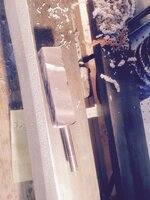This was indeed my first acrylic, but I'd read many threads here about going slow, and believed them. Actually, I had been going pretty slow, or thought I was. I'd been drilling maybe 1/2 to 3/4 inch at a time, retract, and then let bit and blank cool for a couple minutes. I think what got me into trouble was that this was a blank for a long click, and I don't have any bits long enough to keep the flutes clear of the blank when I'm getting close to the full length. So, I end up finishing the drilling by pulling the bit farther out of the chuck and getting the bit in deeper than the flutes. On wood, I've not had a problem, but I guess the acrylic heated up fast when the shavings couldn't get out, and melted to the sides of the hole.
Once I got the bit free, I still had to drill maybe an inch into the blank. I did it maybe an 1/8" at a time, retract, let cool, etc.
Oh, yeah, I'm a believer now.......
Ken

